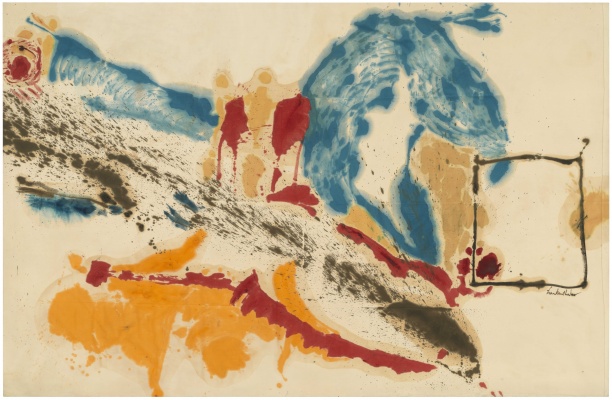Descripción de la Formación
Mística, enigmática y visualmente impactante: así es como se puede describir el performance de Judith Egger "Bardo".
El término "bardo" se refiere al Libro Tibetano de los Muertos (Bardo Thodol: "Liberación a través de la audición durante el estado intermedio"), una colección de sutras budistas del siglo VIII. El texto se centra en el intervalo entre la muerte y el renacer en el que se logran diferentes estados de conciencia. Estas "brechas" o fases de incertidumbre no sólo se pueden experimentar después de la muerte, sino que son una parte esencial de la vida misma.
Judith Egger establece escenas tridimensionales en miniatura en su cavidad bual, un lugar sensible entre el interior y el exterior donde no solo el sonido y la respiración salen de su cuerpo, sino que se genera comunicación. La boca abierta se convierte en escenario, un teatro que revela varias escenas. Va acompañada por el sonido en vivo a cargo del compositor y artista sonoro estadounidense Michael Northam e imagen transferida a la pantalla grande. De este modo, los sonidos del interior de la boca de la artista se integrarán en la actuación.
Aunque las arquitecturas en miniatura colocadas dentro de la cavidad bucal de Judith Egger parecen estar desiertas y bastante estáticas, el parpadeo de un televisor de una sala de estar y la cinta transportadora de sushi en un restaurante muestran algo de movimiento. La espuma dentro de una cavidad rechaza tanto el estancamiento tanto como el agua burbujeante saliendo de una fuente, lo cual simboliza el círculo de la vida.
La artista crea momentos de contemplación y tranquilidad a través de diferentes escenas que anticipan el cambio al mismo tiempo. Lo que sucede más allá de estos espacios intermedios sigue siendo incierto. Los procesos de llegar a ser, crecimiento, transformación, intervención, pero también de descomposición o decadencia son fundamentales para el trabajo artístico de Judith Egger. En los performances, instalaciones, objetos y dibujos, explora, a menudo en diálogo con diferentes disciplinas científicas, las condiciones cambiantes del origen orgánico, artificial o espiritual.
Nadine Seligmann
_________
BARDO - topographie of the space between
Mystic, enigmatic and visually stunning: This is how Judith Egger’s performance “Bardo” can be described. Circling around states of the in-between and of transition, the term “bardo” refers to the Tibetan Book of the Dead (Bardo Thodol: “Liberation Through Hearing During The Intermediate State”), a collection of Buddhist sutras from the 8th century. The text focuses on the interval between death and rebirth in which different states of consciousness are achieved. These “gaps” or phases of uncertainty can not only be experienced after death but are an essential part of life itself.
Judith Egger establishes three-dimensional miniature settings in her oral cavity – a sensitive place between inside and outside where not only breath and sound leave the body, but communication is generated. The open mouth becomes a stage, a theater revealing various scenes. These will be accompanied live by American composer and sound artist Michael Northam and transferred onto the big. Thereby, sounds from the interior of the artist’s mouth will be integrated into the performance.
Although the miniature architectures placed inside Judith Egger’s oral cavity appear to be deserted and rather static, the flickering of a TV set in a living room and the sushi conveyor belt at a restaurant show some movement. The foaming froth inside a cave refuses stagnation as much as the sparkling water of a fountain symbolizes the circle of life. The artist creates moments of contemplation and tranquility through different scenes anticipating change at the same time. What happens beyond these intermediate spaces remains uncertain.
Processes of becoming, growth, transformation, intervention but also of decay are central to Judith Egger’s artistic work. In performances, installations, objects and drawings she explores – often in dialogue with different scientific disciplines – the changing conditions of organic, artificial or spiritual origin.
Nadine Seligmann
_______
Judith Egger (Bavaria, Germany, 1973) lives and works in Munich, Germany.
She obtained a diploma in Design in Communication FH Augsburg, University of Lancashire, Preston, United Kingdom (1993-1997) and in 2001 graduated from the Royal College of Arts in London.
Artistic director of the international art project "open-here" financed by the European Union (2006-07). She is currently the director of the Institute of Hybristics and Empirix Sciences of Swelling Bodies, which investigates the strength and transformative power of organic energy, and also directs the experimental music brand Edition Graphon.
Judith Egger explores in her work the relationships between nature, art, science and humanity, investigating the transformation processes that affect matter and, consequently, the human being. Her interest includes the analysis of both scientific and physical processes as well as those incorporeal as the spirituality that directs and transforms our existence.
She has made numerous solo and group exhibitions in museums and galleries in France, Mexico, United Kingdom, Spain, Japan, United States, Austria, Hungary, Colombia, Italy, Namibia and Germany.
--------------------
CRÉDITOS
Artista: Judith Egger
Proyecto-Performance: Bardo. Topografía del espacio intermedio
Año: 2012
5 escenas en miniatura para el interior de la boca.
Proyección de video en vivo, música electrónica.
Sonido: Michael Northam
Cámara: Jota Morote
Duración: 45 min.
Premio de música 2012.
Realizado con el apoyo del Consejo de Artes de Munich.
Histórico
BARDO- Topografie des Zwischenraums. MUG, Metro de Munich en Einstein en 2012.
BARDO se realizó nuevamente en 2013 en la Galería Esther Donatz / Munich. Esta vez con Axel Nitz como artista de sonido y otra vez con Maria Rilz como cámara.
El documental "BARDO" se mostró en la exposición "Singing Sculptures" en la Rathausgallerie / Kunsthalle München, 2014, así como en la exposición Förderpreise Bildenende Kunst, Lothringer 13, 2013.

Exposición. 11 abr de 2025 - 28 sep de 2025 / Museo Guggenheim Bilbao / Bilbao, Vizcaya, España

Formación. 08 may de 2025 - 17 may de 2025 / Museo Nacional Centro de Arte Reina Sofía (MNCARS) / Madrid, España